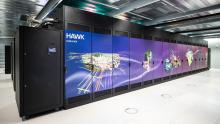In the module HPC Clusters - Setup & Operation , you gained insights into the key hardware and software components of HPC clusters, as well as the technical aspects of integrating them into an organization. Building on that foundation, HPC Clusters – Design, Costs & Sustainability introduces operational models, including "on-premise" and cloud solutions, while examining their advantages, disadvantages, and cost structures.
You will first explore operational models for HPC clusters, comparing the benefits, drawbacks, and cost structures of on-premises and cloud solutions. Next, the course focuses on designing an HPC cluster. Using specific requirements—such as software usage frequency, duration, and benchmarks—you will determine the necessary number and performance specifications of critical cluster components like processors, memory, and networking.
For your proposed cluster, you will calculate both investment and operational costs and evaluate various potential solutions. The course also covers essential business management concepts, such as investment evaluation, cost accounting, and decision-making theory neccessary to select the most suitable offer for an HPC cluster.
Recognizing the increasing importance of sustainability and climate change, this module focuses on integrating sustainable practices into HPC operations. You will learn to develop and implement sustainability strategies and gain knowledge of key environmental certifications, including EMAS, ISO 14001, ISO 50001, and the “Blue Angel for Energy-Efficient Data Center Operation.”
